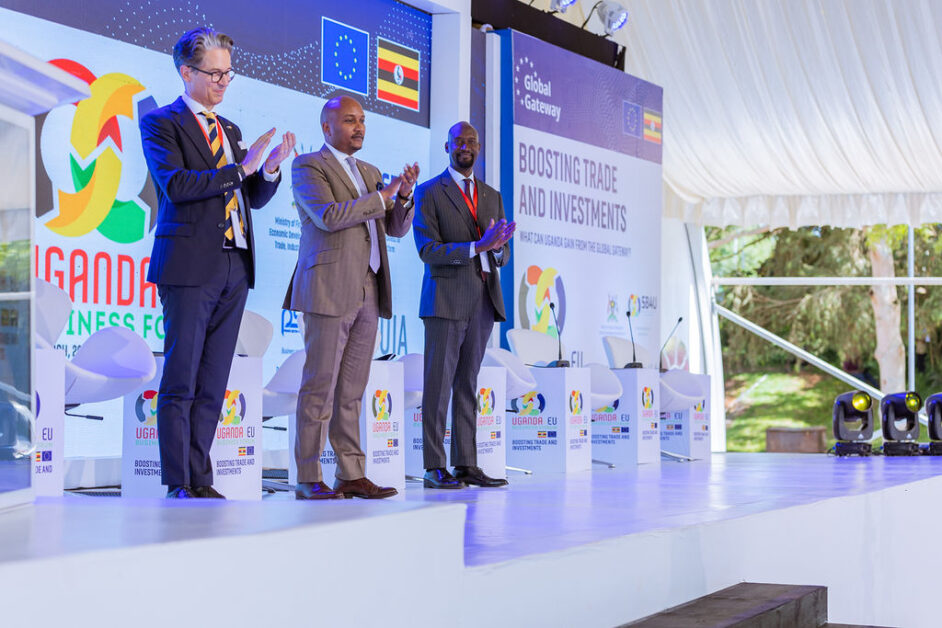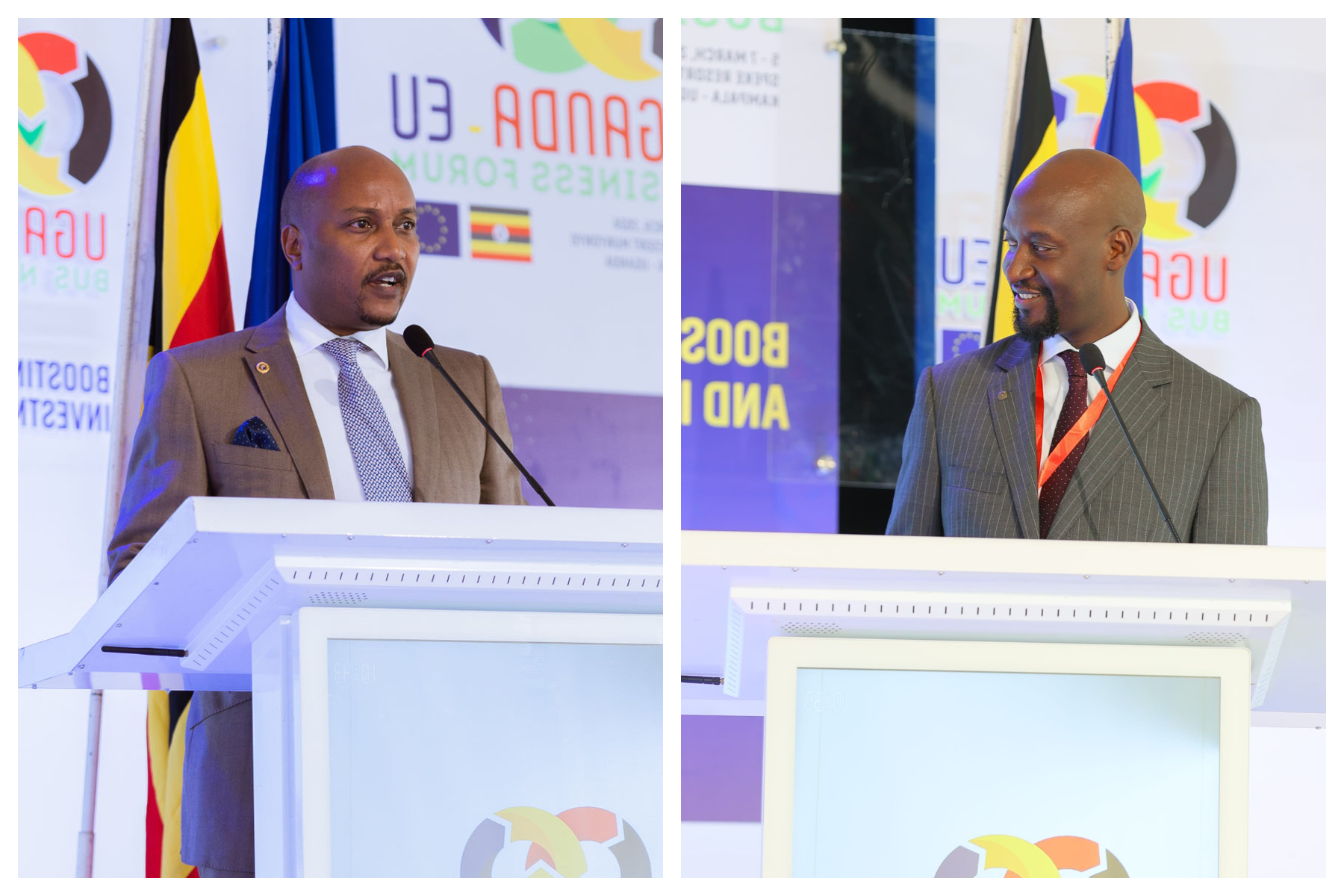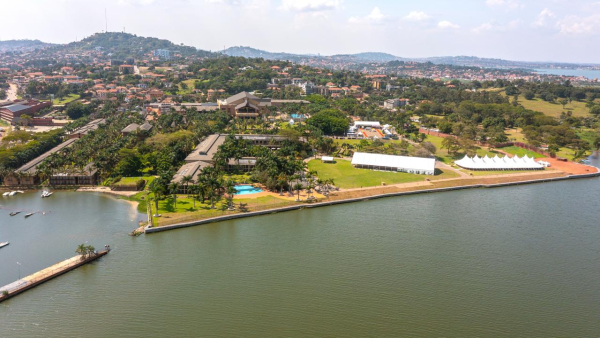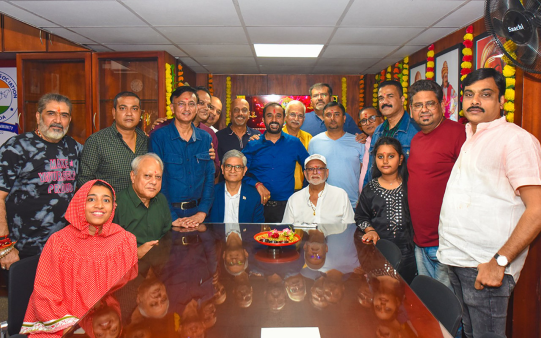Uganda is one of Africa’s competitive destinations for investment, with high returns on investment, Morrison Rwakakamba, the Chairperson of the Uganda Investment Authority (UIA) told European investors and other delegates attending the just-ended 2024 Uganda-European Union Business Forum at the Speke Resort Munyonyo, Kampala.
“Uganda is an appealing destination for Foreign Direct Investment (FDI),” Rwakakamba said, adding: “Key to Uganda’s investment appeal is the rate of returns enjoyed by investors, averaging 13.8% in 2022, the highest in the EAC and the 4th in Africa.”
Rwakakamba, who urged the investors in the room and attending online, to leverage the already existing favourable trade relations between the European Union and Uganda said that “substantial wealth creation lies in five core areas: commercial agriculture and agro-processing, mineral value addition, tourism, manufacturing, and enabling infrastructure.”
“We encourage our EU counterparts to seize the diverse opportunities available in these areas. Uganda’s membership in regional blocs, such as the East African Community, the Common Market for East and Central Africa, and the African Continental Free Trade Area (AfCFTA), provides access to expanded regional and continental markets. With the DRC joining the East African Community Common Market, investors can tap into a market that has grown to over 302 million people. The AfCFTA opens doors to a market of over 1.3 billion people across 55 countries, with a combined GDP of US$3.4 trillion,” Rwakakamba said.
“For example, for pharmaceuticals Uganda imports medicines and medicaments worth about USD500 million. Therefore if you come and set up, there is an existing market. The entire EAC countries import USD1 billion of edible oils. We already have the raw materials here, so come and set up and work with our local partners and set up these factories, to benefit from these opportunities,” he said.
He also invited the investors to take advantage of a raft of business-enhancing financial, fiscal, and regulatory incentives.
“These include a 100% exemption of tax on income from agro-processing activities, access to serviced parks, and exemption from customs duty on plant and machinery, among others. For those choosing to locate in our Business and Industrial Business Parks, a generous 10-year tax exemption awaits, provided a minimum investment of USD 50 million for foreign investors and USD 10 million for domestic investors,” Rwakakamba reiterated.
He also said that UIA had established an investment land bank of 84 sqm of land across the country, “where we offer free land investors to set up factories”.
Uganda has a lot to offer
Humphrey Nzeyi, the Chairman of the Private Sector Foundation of Uganda (PSFU), invited European investors to invest in Uganda’s Tourism and leverage the uniqueness of Destination Uganda.
“We know that that EU citizens spend a total of EUR 979 billion every year. I am glad for those of you who have made it here to be able to be captivated by the beauty of Uganda first-hand and I am sure you know why Lonely Planet voted Uganda the number one destination to visit in the world. Uganda boasts many attributes and is one of the only destinations where tourists can see the big five as well as the great areas. Tourism is one of the sectors in our economy where we have seen the most direct impact on the population as tourists spend their funds directly in our rural economies impacting communities directly. We have a lot to offer,” Nzeyi emphasised.

The Private Sector Foundation of Uganda is the Apex body of the Private sector in Uganda. The membership is made up of over 310 member organisations across thirteen sectors of trade and business, ranging from tourism to agriculture to manufacturing to logistics to mining and many more. We cover the full spectrum of businesses in Uganda and through our member organisations, we represent a total of over 2.5 million business enterprises in Uganda.
Mr. Nzeyi also said Uganda had vast untapped opportunities in the mining sector over and above oil and gas.
“Uganda boasts of minerals such as Gold, Copper, cobalt, rare earth minerals and many more that are yet to be fully exploited,” he added.
In agriculture, he said that there were vast opportunities in value-addition in the agriculture sector, starting with coffee which is the most dominant export to Europe.
“Coffee currently makes up about 65% of all our exports to the EU. The majority of this export remains in the tons of green beans. We must look for innovative ways to disrupt this value chain to create more value for the local farmer through value addition and traceability that rewards quality. This is an area where we both can do better and find a way to put more value in the hands of the farmers,” Nzeyi made a passionate pitch.
This 3rd edition of the Forum attracted more than 3600 individuals online and physically. Public and private sector representatives from Uganda as well as the various European Union Member States, including France, Germany, the Netherlands, Italy, Belgium, Denmark, Sweden, Ireland, Portugal, Austria, the Czech Republic, Poland, and others, attended.
Key European DFIs such as Development Finance Institutions such as Agence Française de Développement (AFD), Proparco, European Investment Bank (EIB), Kreditanstalt für Wiederaufbau (KfW Development Bank, GIZ, Enabel, FMO: Dutch Entrepreneurial Development Bank and European Development Finance Institutions (EDFI) were well represented.
Uganda’s President Yoweri Kaguta Museveni was the Chief Guest. The European Commission’s Deputy Director General for International Partnerships, Myriam Ferran was present. At the Forum eight projects with a total financial envelope of over €200 million designed to support small business owners, young female entrepreneurs, agribusinesses as well as vital digital infrastructure projects in Uganda were unveiled.
The Forum also provided an opportunity for 30 Ugandan companies to pitch to European investors for a total investment value of at least €14 million (60 billion UGX).
The event also provided an opportunity for 100 Structured Business-to-Business (B2B) meetings between European investors and Ugandan entrepreneurs.
90 exhibitors were also given a chance to showcase their businesses.

 I&M Select Banking Sapphire Club wins “Best Innovation of the Year” at UMEAS 2025
I&M Select Banking Sapphire Club wins “Best Innovation of the Year” at UMEAS 2025


